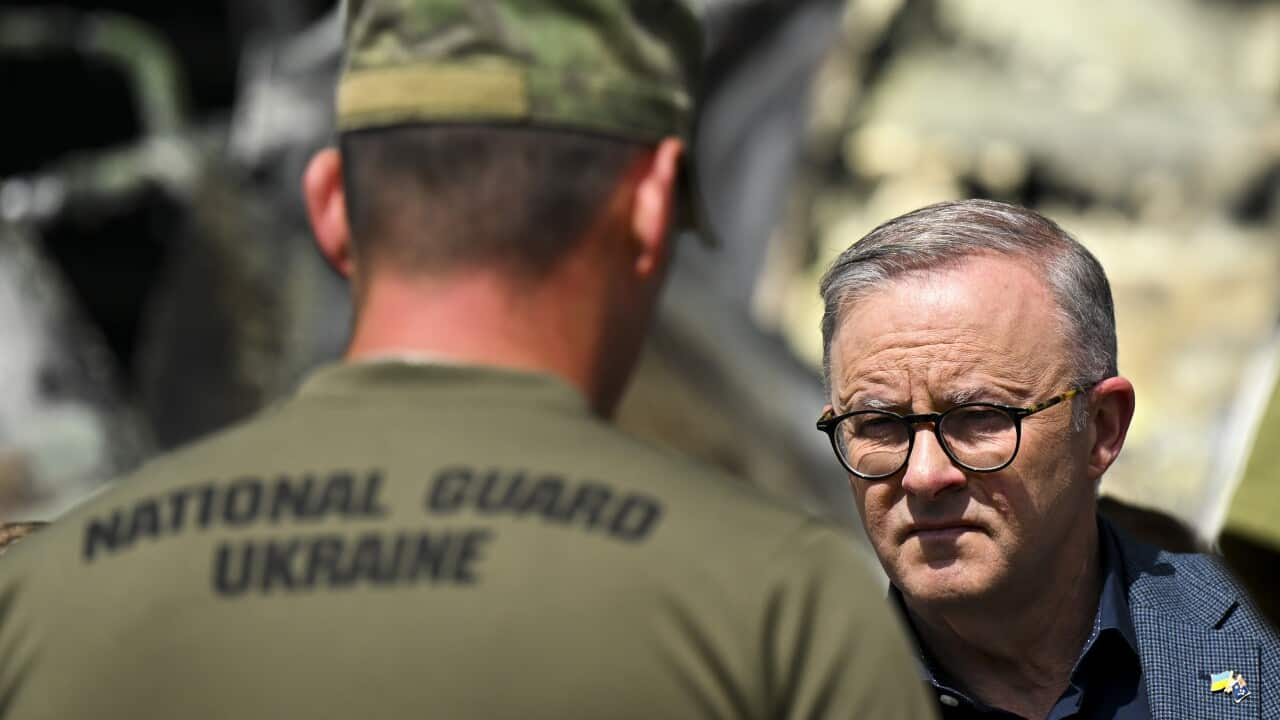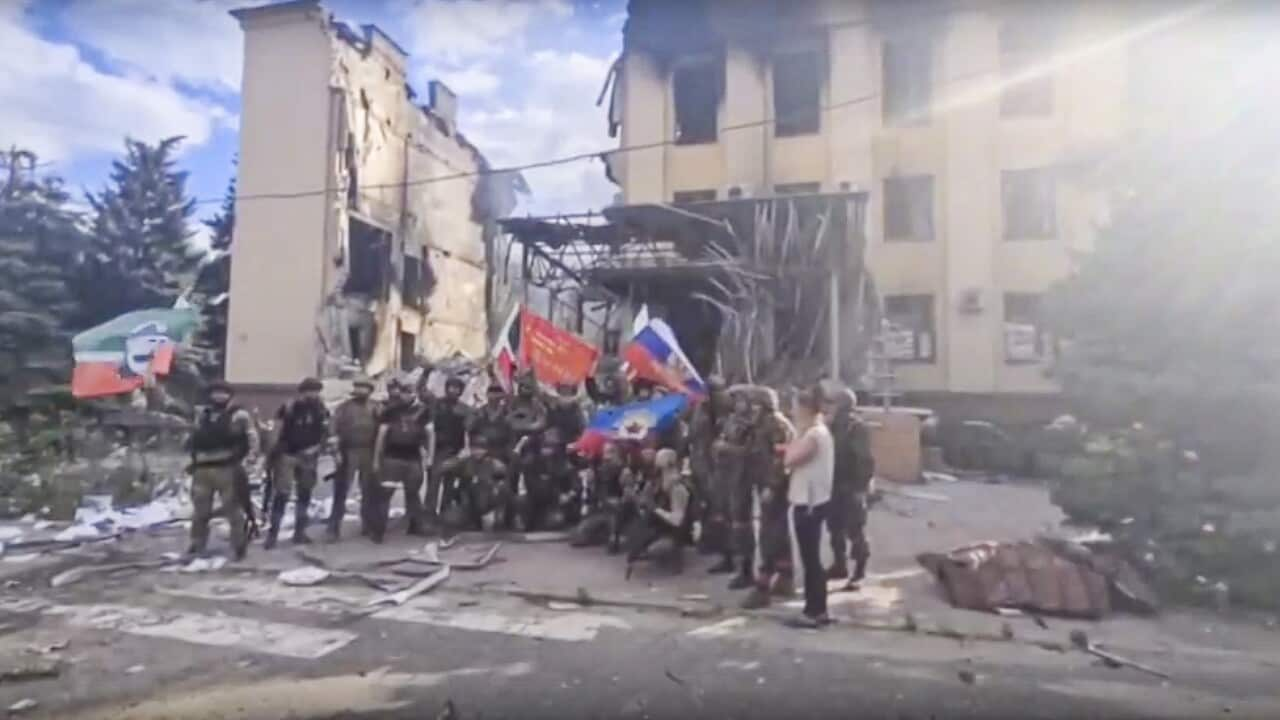Key Points
- Prime Minister Anthony Albanese announced more sanctions on Russia and more military aid for Ukraine on his first visit to the war-torn country.
- Australia will provide 34 additional armoured vehicles to Ukraine and prohibit Russian gold imports, Mr Albanese has said in Kyiv.
When the Russian invasion of Ukraine started on 24 February, Australian embassy staffer Nadia Teriokhina had one thought — she didn't want to get trapped behind enemy lines.
She told Prime Minister Anthony Albanese she counted herself among the lucky ones.
Ukraine says hundreds of people were massacred in Bucha outside of Kyiv, and about 10 minutes from her home in Irpin, including women and children. Some women were raped before they were killed.
Russia denies the allegations.
"We didn't know what to do, how to behave or where to run," she said on Sunday.
"I said to my husband, 'I just don't want to be in the occupied territory' so we went to Kyiv."
Ukrainian tanks were headed in the opposite direction as they fled to the capital.
The executive assistant embraced her boss, Australian Ambassador Bruce Edwards, when they reunited at the weekend outside what was left of her apartment block.
Both are waiting for the Australian embassy to reopen in Kyiv so they can restart work.
Ms Teriokhina's own flat was undamaged but the building was condemned as unsafe.
"I had somewhere to stay, in Kyiv right now. But some of my neighbours, especially the elderly people, have nowhere to go," she said.
Mr Albanese travelled to Ukraine in a party including three members of the media amid very tight security. At least a dozen armed Australian Special Forces soldiers were on the ground to assist.
The party's vehicle convoy carried weapons, body armour and medical provisions in case of an emergency.
Ukrainian special forces, in full battle kit, also shadowed the prime minister's every move.
'Bucha is now a notorious name': Anthony Albanese pays respects at mass grave
Mr Albanese travelled first to Bucha, to pay his respects at a mass grave where 416 civilians were buried by Russian forces after allegedly being executed.
"Bucha is now a notorious name," local council head Tars Shaprovskiy told him.
"This is a very sad place.
"Every one of them shot. This was not collateral damage, this was intentional.
"One of the slaughter houses was a summer camp. There were four volunteers there. They were all shot."
Mr Albanese told him: "Australia shares your desire to seek justice for these war crimes, and we will continue to do so".

Anthony Albanese lights a candle at St. Andrews Orthodox Church in Bucha on the outskirts of Kyiv, Ukraine. Source: AAP / LUKAS COCH
In a chapel underneath the church, Mr Albanese joined the congregation, lighting a candle for the victims of the massacre.
Mr Albanese travelled in an armoured LandCruiser. Local traffic was blocked wherever his party went, with soldiers and police stationed along the route.
Central Kyiv appeared largely undamaged to the visitors, but concrete blocks and sandbags protect major buildings, and large welded steel road spikes sit at the sides of key routes into the city, ready to be deployed if the invaders try to attack the city again.
Some shops and hotels have reopened. There was even a small group of tourists milling around near the Intercontinental Hotel, which Mr Albanese's team used as a base during the visit.
But 30 minutes north of the city, signs of war are obvious - blown-out buildings, missile craters, broken windows, piled-up wrecks of burned-out cars and sandbagged foxholes under the cover of trees.
Ahead of his meeting with President Volodymyr Zelenskyy on Sunday afternoon, Mr Albanese visited the destroyed Hostomel Airport, the site of a failed Russian paratrooper assault in the initial days of the invasion aimed at securing the facility to surge in troops and supplies by air.

Prime Minister Anthony Albanese speaks to members of the Ukrainian National Guard at Hostomel airport on the outskirts of Kyiv, Ukraine. Source: AAP / LUKAS COCH
He spoke to members of the national guard unit that faced a determined attack by Russian forces to land helicopters at the airfield, which could have changed the course of the war.
As he left, they gave him a model of the famous Antonov plane.
Mr Albanese said as a former aviation minister, he was touched by the gesture, and the model would take "pride of place" in his prime ministerial office.
Ukraine's Ambassador to Australia, Vasyl Myroshnychenko, travelled to Kyiv for the visit on behalf of the president.
An advance security team comprising 2nd Commando and Special Air Service Regiment personnel was deployed to the country to work with the Ukraine Defence Force and the Australian embassy - now based temporarily in Poland - to make the visit happen.
A member of the team said the capital was mostly safe. The main risk was a potential missile strike.
Russia has recently upped its use of rockets against targets across the country in retaliation for Ukraine's use of American-donated high mobility artillery rocket system missiles.
Ukraine's Deputy Foreign Affairs Minister Mykola Tochytskyi said things were "much more difficult in the east", where Ukrainian forces are being pounded relentlessly by Russian artillery.

Anthony Albanese tours damaged residential areas in Irpin on the outskirts of Kyiv, Ukraine. Source: AAP / LUKAS COCH
"That's why we appreciate Australia's support, in Bushmaster (protected vehicles), and M777 artillery. They are very effective."
The trip was made under a strict media blackout imposed by the prime minister's office on the advice of the Australian Defence Force.
But his presence in the country was revealed on social media, as he travelled around the Ukrainian capital and its surrounds.
Mr Albanese also met the Australian embassy's driver, Oleksander Lazarachuk, who fled the fighting in February with his elderly mother, taking her 400km to Lutsk, in the country's west.
"She didn't want to leave, but I just took her and off we went," he said.
Mr Lazarachuk had mixed feelings about meeting Mr Albanese, who was being driven by his special forces team.
"I should be driving you today," he said. "I am the embassy driver."
Australia to give an extra $100 million in aid to Ukraine
Mr Albanese unveiled an extra $100 million in Australian support for the country after meeting its president during a two-hour meeting in Kyiv.
He pledged Australian support for the rebuilding of Ukraine after its war with Russia is over, and paid tribute to the country's “bravery and determination” in resisting the Russian invasion.
The prime minister said Australia would provide an additional 20 Bushmaster protected vehicles and a further 145 armoured personnel carriers to support the country’s war effort.
Announcing the support while standing beside Mr Zelenskyy in the Presidential Palace in Kyiv, Mr Albanese said his visit to the war-torn country was a demonstration of “the solidarity that exists” between the Australian and Ukrainian people.
Mr Zelenskyy welcomed the assistance but declared: “It is never enough when you have such an adversary.”
“Enough is when we have some kind of advantage, to push them out of our territory,” he said. “Any single state cannot provide for this no matter how hard they try.”
He said he suggested to Mr Albanese that Australia “join the post-war rebuilding process of Ukraine”, which is set to cost trillions of dollars.
“I am grateful for (Australia’s) decision to join the process. It is important for us, it is important for the whole world,” he said. “It is a very ambitious project, I would like to express words of gratitude for (the) negotiations, for coming today for Ukraine.”
The visit was the first by an Australian prime minister to the country, which Mr Zelenskyy said he wished had happened in more peaceful times.
Mr Albanese met with the Ukraine president for two hours on Sunday to discuss the fresh support, after touring devastated areas of Kyiv and the site of the alleged Bucha massacre outside the city.
Missing from the announcement was more M777 howitzers, or superseded artillery pieces, that had been requested by Ukraine, along with 155mm howitzer ammunition.
Mr Albanese also failed to announce the reopening of the Australian embassy in Kyiv, as expected.
He said he hoped to reopen the mission “as soon as possible”, but was waiting on additional security advice.
The extra Bushmasters come on top of 40 already promised or delivered, while the additional M113 armoured personnel carriers followed 14 already promised.
Australia will also provide further military equipment, including drones, and support to Ukraine’s border guard service to upgrade its hardware and cyber security.
Australia to support Ukraine 'for as long as it takes'
The extra Australian support brings total Australian assistance to Ukraine to about $390 million.
Mr Albanese said Australia would continue to support Ukraine “for as long as it takes for Ukraine to emerge victorious”.
“You are fighting for the international rule of law,” he said.
Mr Albanese said Australia would allow duty-free access to Ukrainian imports into Australia, prohibit imports of Russian gold, and intervene in the International Court of Justice in support of Ukraine’s case against Russia.
He also announced sanctions and travel bans on a further 16 Russian ministers and oligarchs, bringing to the number of individuals target by Australia to 843, and the number of sanctioned entities to 62.

Australian Prime Minister Anthony Albanese, checks apartment buildings and vehicles damaged by Russian shelling, during his visit to Irpin, on the outskirts of Kyiv, Ukraine, Sunday, July 3, 2022. (AP Photo/Nariman El-Mofty) Source: AP / Nariman El-Mofty
“We saw residential buildings that have been the subject of brutal assault from missiles and other weapons,” he said.
“Clearly, civilian areas have been targeted by Russian forces as part of this illegal and amoral war.”
Mr Albanese conveyed Australians’ “admiration and respect” for Mr Zelenskyy’s leadership, and condemned Russia’s “brutal invasion” of Ukraine.
“It is unprovoked, it is against international law, it is against the UN charter”.
The leaders also discussed the country’s food security and its inability to export grain, which has caused international food shortages.
It’s understood the leaders discussed the November G20 summit in Indonesia, which could be attended by Russian President Vladimir Putin, if only virtually.
Indonesia’s President Joko Widodo has resisted suggestions by the US and other nations that they could boycott the event if the Russian President attends.
Mr Zelenskyy, who was personally invited to attend the summit by Mr Widodo on his recent trip to Kyiv, said he was “not sure there will be a great number of participants if (Russia) … decides to attend”.
He said he “cannot imagine myself arriving” at the Indonesian-hosted summit if the war with Russia was still continuing then.
Mr Albanese reiterated that Australia would attend the summit, even if Mr Putin did, because of Australia’s relationship with Indonesia. But he said Australia supported “isolating Russia as much as possible, and my presence here is an indication of that”.
“If it is the case that Mr Putin attends that meeting, and I’m not sure whether he will or not, he will get the reception he deserves”.











